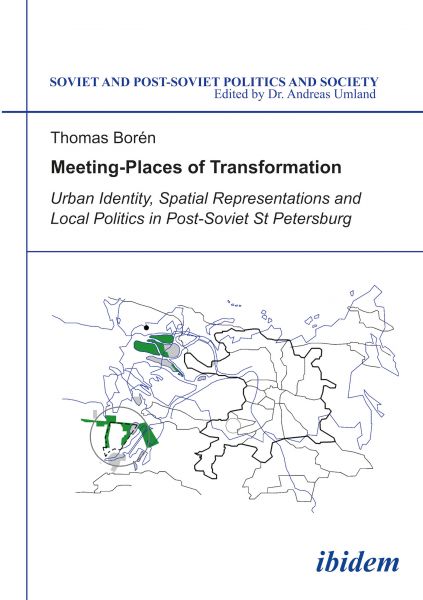Meeting Places of Transformation. Urban Identity, Spatial Representations and Local Politics in St.
What happened with the urban spaces of everyday life when the Soviet Union collapsed? And how may this change be understood? Based on long-term qualitative fieldwork in post-Soviet Russia, this study draws upon time-geographic, social and semiotic theory to formulate a model of how urban space is formed. Mirrored through the case of Ligovo/Uritsk, a high-rise residential district situated on the outskirts of Sankt-Peterburg (St Petersburg), the changing relation between the lifeworlds of people and the system of governance is highlighted with regard to the transformation of Soviet and Russian society over the last decades. The empirical material presented here documents a number of processes within urban identity formation, spatial representations and local politics. The resulting findings add both empirically and theoretically to the knowledge of urban cultural geography in Russia – a field of research that until recently was closed to Western researchers, and seems currently to be closing again.The book will be of interest to researchers with an interest in social, semiotic and geographic theory as well as to students and researchers of cultural and urban studies, urban life and Russian affairs. The study could be also helpful to professionals working in fields related to post-Soviet urban identity, spatial representations and local politics. "Borén's engaging, invaluable study is in some respects ground-breaking, and provides a primer for geographers interested in the application of phenomenological and hermeneutical approaches to urban observer-participant fieldwork." Dr. Charles Travis, Research Fellow, Trinity College Dublin
Thomas Borén, MSc, PhD, is Researcher, Senior Lecturer and Programme Director for Urban and Regional Planning at the Department of Human Geography at Stockholm University. Among his publications are the co-edited volumes Everyday Economy in Russia, Poland and Latvia (2003), Metropolitan Processes in Post-Communist States (2007), and Kring Beringia [About Beringia] (2008). Borén is also editor-in-chief of Geografiska Notiser, a quarterly geographical journal.
Versandkostenfreie Lieferung! (eBook-Download)
Als Sofort-Download verfügbar
- Artikel-Nr.: SW9783838257396450914
- Artikelnummer SW9783838257396450914
-
Autor
Thomas Borén, Thomas Borén
- Mit Andreas Umland, Andreas Umland
- Wasserzeichen ja
- Verlag ibidem
- Seitenzahl 234
- Veröffentlichung 01.02.2014
- ISBN 9783838257396
- Mit Andreas Umland, Andreas Umland

